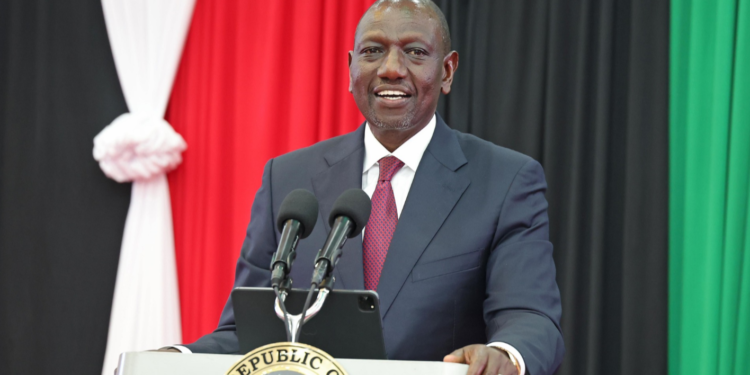President William Ruto has called for a radical reform of international credit rating systems and debt sustainability frameworks to better reflect Africa’s economic realities.
Speaking at the 2024 Summit of the Forum on China-Africa Cooperation (FOCAC), he urged closer collaboration between China and African nations to support these reforms and unlock further development opportunities.
In his address to the summit, Ruto highlighted the challenges posed by an “unjust international financial system,” which he said limits the ability of African nations to fully capitalize on opportunities provided by the Belt and Road Initiative (BRI). He advocated for a restructuring of debt management practices and called for a revision of how African assets and GDP are evaluated to provide a more accurate assessment of debt sustainability.
“We shall be holding the first African meeting in Congo-Brazzaville next month to establish parameters for the proper evaluation of African assets and gross domestic product,” Ruto announced. He emphasized the need for “new modalities for determining Africa’s debt sustainability using Africa’s real wealth.”
Ruto’s remarks come against a backdrop of growing concerns over debt sustainability in African countries, which have been heavily affected by global shocks such as pandemics, climate change, and geopolitical conflicts. These factors, he noted, have made it difficult for many developing economies, especially in Africa, to access the financial resources they need to recover and grow.
The Kenyan leader also called on China, Africa’s largest trading partner, to support efforts for a fairer international financial system that would benefit the Global South. He urged Beijing to “rally the rest of their shareholders to double their contributions to multilateral development facilities,” such as the African Development Bank and the International Monetary Fund’s Special Drawing Rights (SDR).
Ruto underscored the need for China’s collaboration on debt treatment, proposing measures that include “reprofiling of debt to incorporate a longer grace period and longer tenure for both existing and future financial facilities.” This, he argued, would provide African countries with the fiscal space necessary to invest in crucial sectors such as infrastructure, social services, and economic stabilization.
He commended China’s previous contributions but stressed the importance of increased concessional funding to help heavily indebted African countries manage their financial obligations more sustainably. “We received the news this morning of President Xi’s statement on their contribution in this respect with a lot of gratitude,” Ruto said.
Ruto also pointed to the successes of the Belt and Road Initiative in Africa, describing the partnership as a transformative force for development across the continent. He cited projects in Kenya, including the 600 km Standard Gauge Railway, the modernization of Lamu Port, and the construction of a new oil terminal in Mombasa, as evidence of BRI’s positive impact.
“The relationship between China and Africa, and Kenya specifically, is so real that this year, early this year, when I went to one of our rural towns, citizens were asking me for an airstrip,” he said, highlighting the strong demand for further infrastructure development supported by China.
President Ruto praised China’s decision to open its markets to African agricultural produce, calling it a “measure of true friendship.” He noted that such trade cooperation has the potential to drive economic growth and diversification across the continent.
By improving road, rail, and air connectivity, Ruto argued that the BRI is well-positioned to “unlock the vast potential for intra-Africa trade” and facilitate the implementation of the African Continental Free Trade Area (AfCFTA), which could boost manufacturing and create more jobs.
However, Ruto acknowledged that the full promise of the BRI has been “severely undermined by major threats,” including global pandemics, geopolitical tensions, and climate change. These challenges have created economic stress and increased debt burdens, especially for the least developed countries in Africa.
He urged all summit participants to “lend their full support to China and Africa” in tackling these global challenges through closer cooperation and partnership.


















